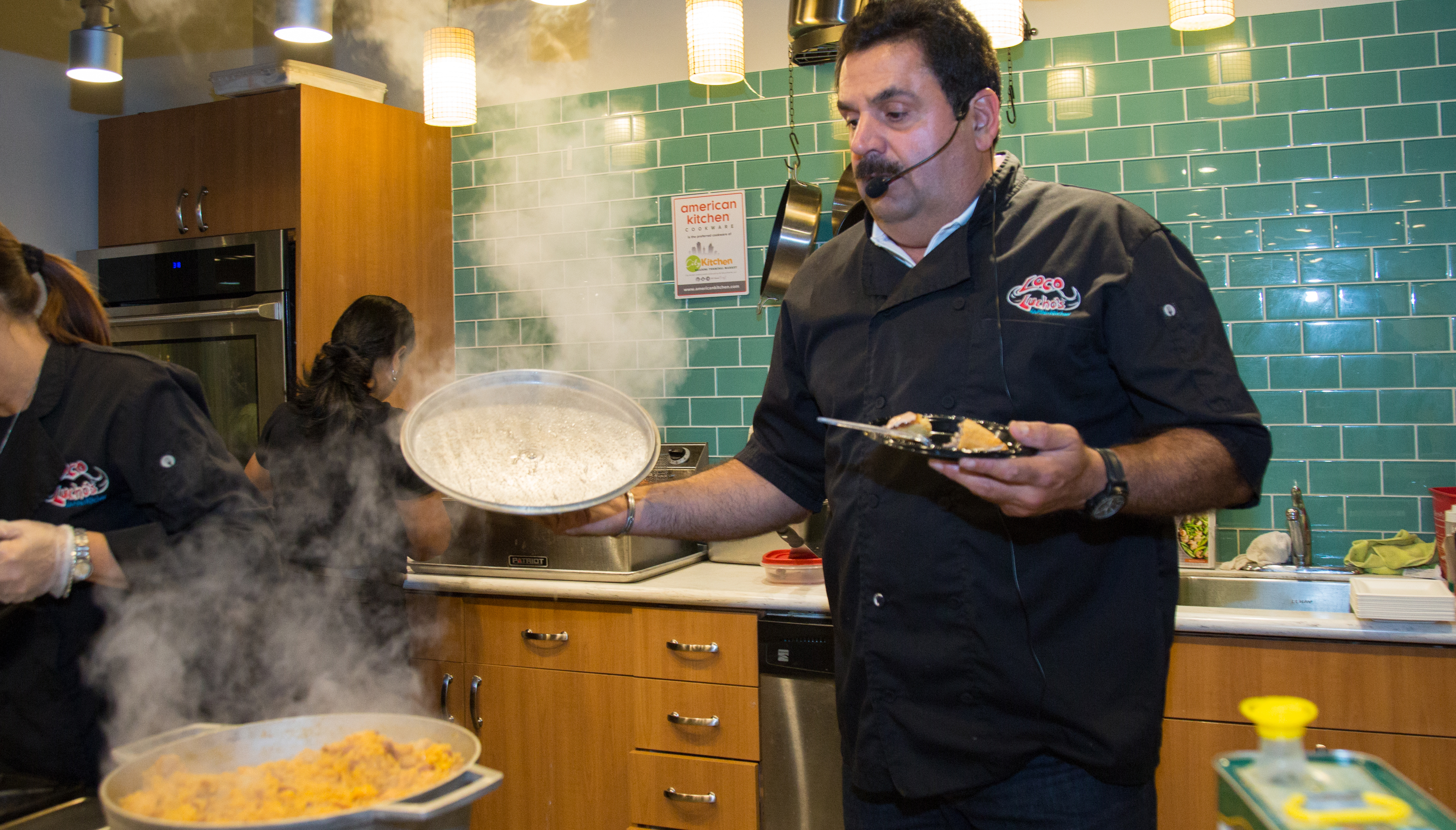
Loco Lucho: Behind The 'Stache
A newcomer to the “Phoodie” scene with a knack for traditional tastes, boricua chef Luis Liceaga will be the owner of the first authentic Latin American stand…
“There’s nothing like that moment…. That moment when people take a bite out of something that they love. Their eyes don’t lie- they can’t. Their eyes light up. That, to me, is what gives me my passion, because it is an immediate reward”, Chef Luis Liceaga proudly says, the corners of his darkly mustached mouth rising up to brush his own beaming eyes.
His joy is uncontrollable, and though he modestly shrugs off the suggestion that he is a Latino who has made it in business, his reality (like the first reaction to tasting something absolutely delectable) is undeniable: he is one of the lucky few that has successfully transformed a hobby into a venture.
Yet, some hobbies are borne from a place that goes deeper than talent; some hobbies find their origin in a domain that extends further than merely taking pleasure from making uniquely-stuffed empanadas for P.T.A. events and grilling churrasco at corporate Eagles tailgates.
Some hobbies are not hobbies at all, rather, they are intense yearnings in the soul that are fated to be wielded, predetermined crafts that are impossible to counteract. We don’t call these people who practice their loves hobbyists, we call these people gifted.
For Liceaga, his skills with the saucepan and the spatula were seared onto his DNA long before he would wear his signature black chef’s coat.
When reviewing the cookbook Cocina Criolla in 1983, New York Times food critic Craig Claiborne referred to Carmen Aboy Valldejuli as the “foremost authority on Puerto Rican cooking.”
The prestige was so warranted, in fact, that the lengthy gastronomical text (originally published in 1954) has been noted as a staple in Puerto Rican households, often becoming a gift passed on from generation to generation by way of bridal gift registry.
What makes Valldejuli’s recipes distinctive is their wholesome simplicity; step-by-steps for rich and hearty comforts like a well-prepared arroz con gandules or an impeccably seasoned sofrito came with no calls for flamboyant garnishes, frilly embellishments, or complicated fusions.
These were the platos that Puerto Rican abuelitas and tías had been making for years, but with Valldejuli’s personal touches and innovative spirit (Cocina Criolla is one of the first Puerto Rican cookbooks ever published), these meals were deified in print. Since the release of the original text in the 50s, there have been over sixty-four different editions made, and most have been published in Spanish. There was little need to alter something that had already transcended into the realm of the sacred.
It pays to have grown up in the kitchen alongside one of the greats: Liceaga was blessed that Valldejuli was his Dad’s aunt. It was with his family that his passion for food- and his ability to make it -with homemade charm flourished.
It also didn’t hurt that Liceaga was descended from Aboy-Ferrer family, one of the most distinguished and wealthy on the Island, which included not only Valldejuli, but also Ramón Aboy Miranda (a notable photojournalist) and José Ferrer (the first Puerto Rican to win an Academy Award).
Privilege, the opportunity to rub-elbows with high-society, and of course, exposure to some utterly fantastic food, would propel Liceaga to the position wherein he could transform a “hobby” into a future fixture in the historic Reading Terminal Market, the first of its kind to come to the Market since its ribbon-cutting ceremony 125 years ago.
The capacity for artistry and networking that his kinsfolk imbued in him and his lineage embedded in him would be fine-tuned at The University of Pennsylvania’s Wharton School of Business, where Liceaga would wind up at as a teenager to pursue an undergraduate degree.

Before bringing a taste of Puerto Rico to Pennsylvania, Lucho (the Latino nickname for Luis), brought the decadent flavors of the streets of Philadelphia back home where he cared for his mother.
Cheesesteaks and water ice replaced his iconic croquetas de cangrejo or his “elevated” take on mayoketchup, making it possible for him to maintain a popular stand on the Island while splitting his time in the States.
After his mom passed away, Liceaga did not let grief trample on his budding “serial” entrepreneurship; this “fuel”, which has driven his locuras, is what his friends and family say he has been simultaneously blessed and cursed with. The hankering for more and the unquenchable urge to seek out more opportunities, taken on more projects, and have less free-time for the sake of good business.
These lapses in sanity have been- for lack of a better word -extremely profitable.
Briefly replacing his cazuela with “corporate swag”, Liceaga formed Impact Dimensions LLC in 2002 with Norbert McGettigan Jr. Described as the “leading provider of premium promotional products, corporate gifting and customized incentive programs”, Impact Dimensions is one of the masterminds behind all of those nifty notebooks and water bottles you are bombarded with when you go to professional conferences or to career fairs. Though this venture isn’t as “sexy” as, say, a golden paella valenciana with locally-sourced ingredients and the elusive water-to-rice ratio spectacularly executed, the demand is there.
In 2016, Impact Dimensions was the official merchandise provider of The Democratic National Convention.
RELATED CONTENT
Nevertheless, the hunger in his soul to cook for others what he had grown up falling in love with persisted, and soon money became irrelevant.
Loco Lucho’s Latino Kitchen was borne in 2006 as a response to Liceaga’s yearnings, but the upcoming “brick and mortar” at the intersection of Avenues C and 5 in Reading Terminal Market started humbly, and as a passion project to satisfy the fancies of peers, colleagues, and his own.

“Fly Eagles, fly!” is what they would first be hollering at the H lot on Sundays and Mondays, but soon after tasting Liceaga’s cubes of queso frito and reuben empanadas, the chatter turned into inquiries:
Do you cater? Would you mind catering my husband’s birthday? Can you butler at my nephew’s bar mitzvah? Will you be available for my daughter’s wedding?
It seemed like Liceaga was constantly impressing 120+ football fans every week with a welcome break from the typical greasy tailgate munchies, and his prestige was growing beyond the surroundings of Lincoln Financial Field.
“People were blown away. And that’s when I decided that… Wherever it took me, I would let it take me. I wasn’t going to stop it, but I wasn’t going to let [the success] control me or the quality of the food either.”
For the past decade, Liceaga and his team (which includes his business partner and sous chef Rafael Nieto, Ms. Ellie Siegel, and many members of his staff that also work with him at Impact Dimensions,) have been wowing attendees with pan con bistec and arroz con habichuelas under the “Loco Lucho’s” brand.
They were even featured on The Rachael Ray Show and on a PBS special, an experience which inspired the “serial” entrepreneur for a future locura: a cooking show, highlighting the recipes that would make his great-aunt Valldejuli cheer on.
But first things first: when the opportunity came for the Loco Lucho’s Latino Kitchen stand at Reading Terminal Market, Liceaga says it was difficult to turn-down the chance to prepare food with sabor (or “purpose”) for the masses and to “take our place amongst some of Philadelphia’s most recognizable food merchants.” Unlike a restaurant, Liceaga insists that the model that the Market provides is much more akin to the street-food and catering style that he enjoys.
Liceaga will also be making history as the owner of the first vendor in Reading Terminal Market to exclusively offer Latin American dishes. He attributes much of his “Phoodie” inspiration to fellow Latino chef José Garces, who is not only a mentor but a friend to Liceaga.
Working with so many marketing creatives may have possibly helped Liceaga design one of the most endearing logos I have seen: a bountiful mustache that is identical to the one the Chef wears like a badge of honor on his upper lip.
This logo, and the scrumptious menu it promises, will be unveiled sometime in 2018.
For now, you can come to AL DĺA’s “Meet the Chefs Transforming Philadelphia Cuisine” event the evening of Tuesday, November 14th 2017 at Independence LIVE to sample Loco Lucho’s insanely delicious tapas.











LEAVE A COMMENT: